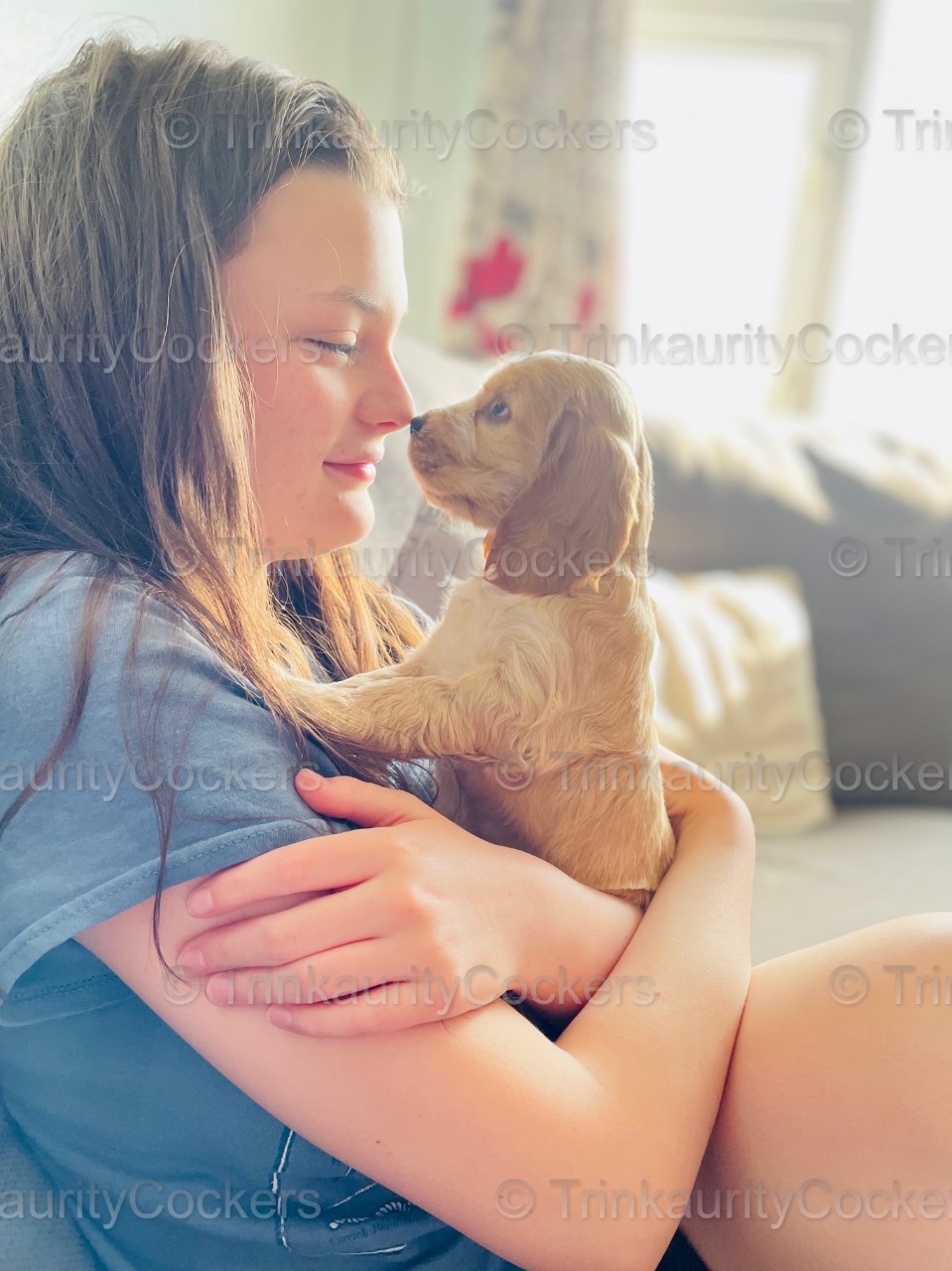How to Choose the Right Puppy

Research….research….research!…
A lot of research is needed looking into the breed of dog you would like to add to your family. Finding the right breed can often be one of the trickiest tasks to a new dog owner, especially if you have not owned a dog before. Once you have narrowed down your choice, speaking to a Breeder will help you determine if your choice of breed will be suitable for your family and lifestyle.
Where to start?!
If you don’t know where to start, head over to the Kennel Club’s website where they have a plethora of information and guidance covering all breeds. ‘Finding the Right Dog’ (https://www.thekennelclub.org.uk/getting-a-dog/are-you-ready/finding-the-right-dog/)
Waiting Lists:
The majority of reputable Breeders will have their own version of a waiting list with families lined up, willing to wait for the right puppy, bred from the right parents, raised in the right environment, to the right standards giving your puppy the best start in life.
Waiting lists will often require families to reserve their puppy at a very early age, so having this knowledge and being secure in everything about where your puppy comes from, is critical.
Breed:
Here is a really helpful overview of so many breeds that can help you narrow down your choice. Choose a breed of dog based on temperament, energy level, and their specific needs…not simply because you think it’s adorable — you may be headed for trouble! This will also determine their adult size, will you have adequate space to house an adult of that breed? Safely transport them? Some breeds have a predicted longer or shorter lifespan, are you able to emotionally and financially manage this? Whilst the Kennel Club would state what sort of garden size you need, my argument is that we do not walk our dogs in the garden! However….at Trinkaurity Cockers, I am looking for committed and dedicated families who can prove they have the capacity to commit to the daily exercise needs of a cocker spaniel, in which case, their garden size is not important to me, but I need evidence that their garden is secure and safe.
For the Cocker Spaniel…click here.
Health:
Consider their health and commonly pre-disposed conditions that are relevant to that breed. Has the Breeder ensured their puppies will not inherit these diseases?
Coat:
Will they be long or short haired? Require 4-8 weekly professional grooming? Can you sustain this for their lifetime? Are you able to dedicate daily grooming provision? Even short coated dogs will require regular grooming. Are you looking for a breed that moults less than others? Whilst all dogs will moult, some will do so more than others. Have a look here and it gives you an overview as to if the breed sheds or not! (https://www.thekennelclub.org.uk/search/breeds-a-to-z/)
Nutrition:
Consider the cost of good quality nutrition and research what you would want to feed your puppy? Diet and nutrition plays a huge role in the long term health, welfare as well as mental state of your puppy. A good place to look at for independent dog food reviews is All About Dog Food.
Training:
Is the breed easy to train? Is it fundamental to their welfare that they seek out daily training and enrichment to keep them health and balanced?
Have you looked into training schools near you? Do they have a waiting list?
Exercise:
What level of exercise will they require as adult dogs? do you have time to commit to this daily? What are their projected energy levels as an adult?
Cost:
Can you afford vet bills? preventative health care (flea/worming/annual vaccinations)? Will you neuter/spay your pet? Will you take out insurance?
Gut Instinct:
Ultimately, you need to do what you feel is right for you and your family, if something doesn’t feel right, walk away!
Vet:
Have you looked at local Veterinary Practice’s near you? What are their reviews like?
Breeder:
Find a Breeder you are comfortable with, whilst that goes without saying, it is critical that you feel secure in their practice. If the breeder can’t answer your questions, or makes you feel uncomfortable for asking a question in the first place — walk away!
A good breeder will be transparent, they will have nothing to hide. There are amazing Breeders of all breeds across the world, who dedicate their lives to the raising of healthy dogs and their offspring. They are committed to health testing, preventing the continuation of deadly diseases, they are conscious about inbreeding and they will work tirelessly to ensure the puppy parent receives as healthy and well balanced puppy at 8 weeks as possible. They should be able to speak about their practice with ease, communicating every stage and prepared to keep you informed.
Health & Safety:
It is a good sign when a Breeder has a few health and safety guidelines for you to follow when visiting. Every Breeder has a responsibility to keep all of their dogs healthy and free of disease that could be unknowingly tracked in on shoes and/or clothing from visitors.
Social Media:
Have a look at their social media profiles, do they have them? How far back do they go? Look at their videos, photos, can you see the quality of the setting they are providing to raise their litters? Is it sanitary? Do they meet the developing needs of puppies?
If I was searching for a puppy, I would be looking around in all of the media available, and I would expect to observe a decent level of cleanliness, fresh water, decent equipment (toys and beds) to be available.
Does the Breeder claims to deliver certain programs? Is there any evidence of it? Once you get going with your Detective Mode….you’ll find that you can learn a great deal about your Breeder and how they raise their puppies without having yet had the opportunity to speak with them.
Shaping a Dogs Temperament

🐾 What Shapes a Puppy’s Temperament?
One of the most exciting parts of welcoming a puppy is watching their personality unfold. Every dog is a beautiful individual — but understanding what helps shape their temperament can make all the difference in helping them become confident, calm, and connected.
Here’s what can influence the temperament of your puppy:
🌱 1. Breed Characteristics
Each breed has its own natural traits and tendencies.
Spaniels, for example, are affectionate, eager to please, and full of energy. Knowing your breed helps you understand and celebrate who they’re designed to be — it’s a gift, not a limitation.
🧬 2. Parental Influence
Puppies inherit more than just good looks — they pick up emotional tone from their parents too. At Trinkaurity, I carefully select parents not just for health and structure, but for their calm, affectionate, and loveable temperaments. This gives every puppy the best emotional start possible.
🌍 3. Early Experiences
Temperament continues to be shaped every day, especially during that crucial first year.
From 2–5 months, your puppy’s brain is at its peak for learning — making it the ideal time for gentle socialisation, consistent routines, positive introductions, and joyful experiences.
Your puppy learns from every moment — and you are their greatest teacher.
✨ Temperament vs. Personality
Here’s a simple way to look at it:
-
Temperament is their foundation — shaped by breed, parents, and early handling.
-
Personality blossoms as they grow — shaped by your home, your guidance, and your love.
Your role is powerful. Through calm leadership and positive routines, you’ll help shape the dog your puppy becomes — and it’s a truly wonderful process to be part of.
💛 A Gentle Reminder About Personality
Every puppy starts with a spark — but what that spark becomes is shaped by you. To that end, dogs are incredible mirrors. They reflect the energy, structure, and heart of the home they’re raised in. When we raise them with consistency, confidence, patience, and love, they thrive.
So if you’re dreaming of a puppy with a brilliant personality —
You’re already halfway there.
Because their greatest influence will be you.
If you would like to apply to join the Waiting List to welcome a Trinkaurity puppy into your home, please click here.
